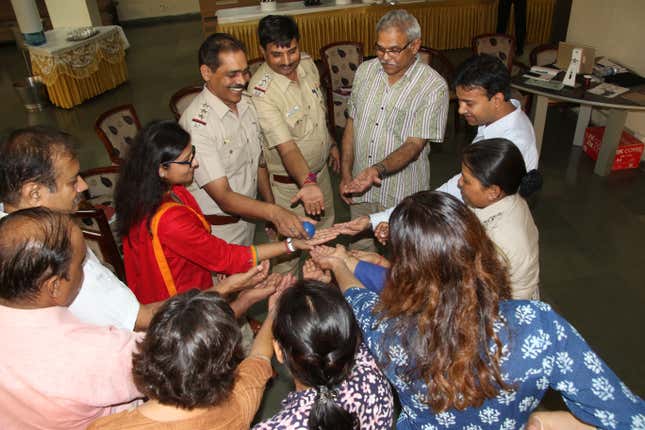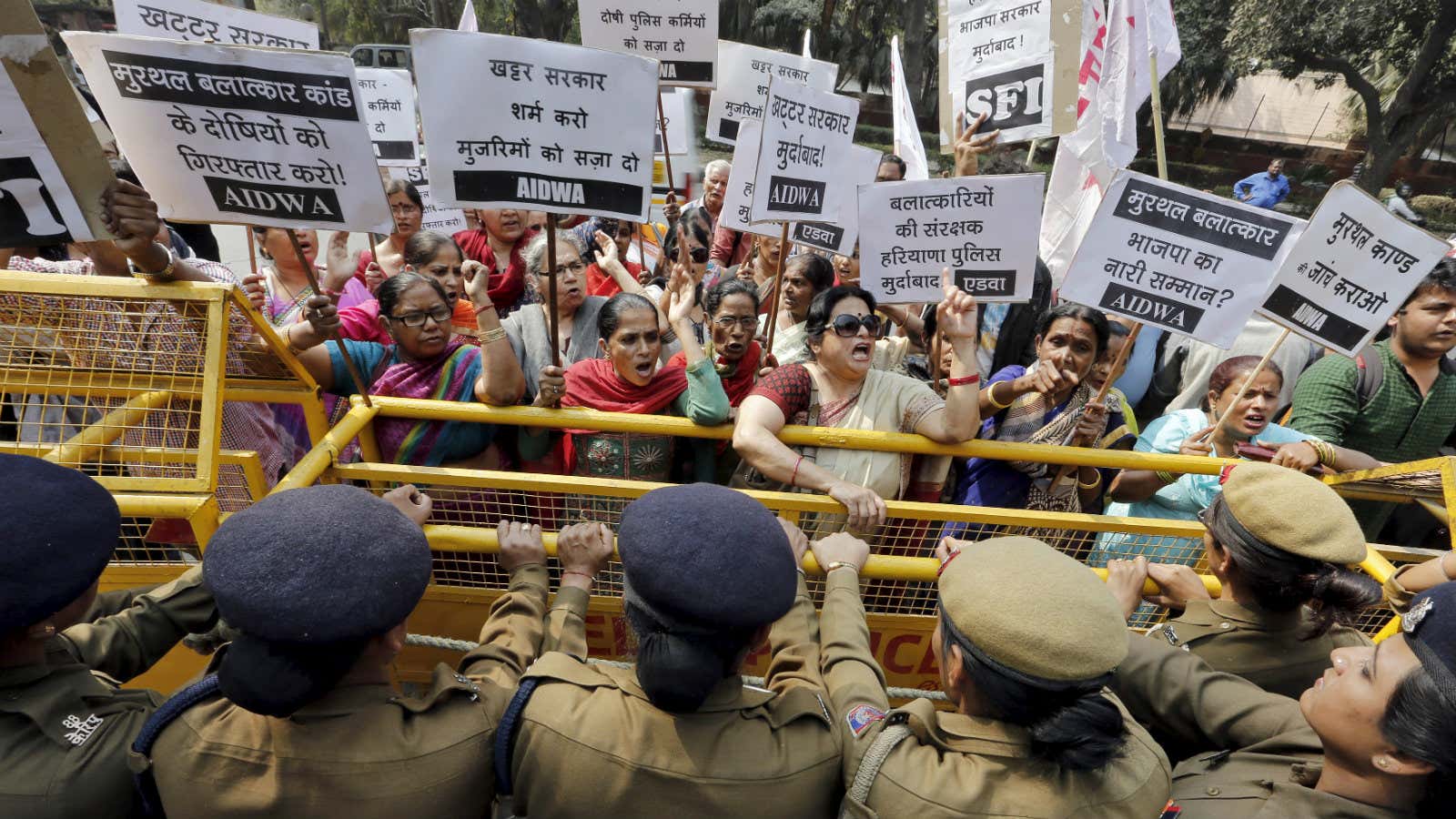Many Indians generally shudder at the very thought of interacting with the police—such is their reputation, built on decades of brutality and intimidation. And there’s no group more distrustful of cops than India’s women, particularly the victims of sexual assault.
Deeply politicised and overwhelmingly male-dominated, the police forces of the various Indian states are known to avoid even filing cases in such instances, let alone acting on them. This is especially true if the accused occupy positions of power. Last year, a report by Human Rights Watch showed complainants themselves have been victimised further by officials, who threaten, assault, or rape them into silence.
Not surprisingly, then, many victims of sexual assault simply choose not to approach the police for help. But over the past two years, the Justice for Her project has been working to change this situation. Designed by the Helena Kennedy Centre for International Justice at the Sheffield Hallam University in the UK, the project has set out to sensitise police officers in Delhi, Punjab, Haryana, and Madhya Pradesh, encouraging them to treat victims with dignity and respect.
“The project that I wanted to do was focused on police training, particularly what they do in the first instances of a woman or girl coming forward,” Sunita Toor, project manager of Justice for Her, told Quartz. It’s this first contact that determines whether a victim of sexual assault proceeds with the process of seeking justice, said Toor, a principal lecturer in criminology at Sheffield Hallam University.
In conversations with police officials, Toor and her team found that their current sensitivity training was hardly up to the mark, and there was a significant knowledge gap in handling cases of crimes against women. So, beginning 2014, the Justice for Her project embarked on a collaborative process to figure out how to develop a comprehensive training programme that was also culturally specific to India.
It conducted a series of workshops with police officers, lawyers, and NGO workers in New Delhi and used their findings to create a lengthy training manual (pdf). This manual identified the various forms of gender violence in India and detailed the best methods for police officers to sensitively investigate complaints while keeping the victim’s safety and comfort in mind.
Later, Toor took this training manual to the police chiefs of all the four states, asking whether it could be included in the curricula of police training academies.
Surprisingly, they were all eager to engage.
“People said, the police aren’t going to work with you, you’re not going to have any success; it’ll be a closed door,” Toor said. “We’ve not had any closed doors.”
The police also suggested state-specific issues, such as incest, trafficking, and attacks by strangers, which were added to the manual to help them deal with the most common crimes against women in their regions.
With senior officers’ approval, Toor and a facilitator began to deploy the training manual at academies across the four states, working with groups of 30 in interactive sessions featuring group discussions and simulation exercises to emphasise their roles as agents for change. Over the past 18 months, around 180 police officers have been trained by Justice for Her. These 180 have then gone on to train their subordinates.

Agents of change
The key, Toor says, was to remind the officers of their value and help them see themselves as beacons of justice in the community.
“I think this is one of those key challenges: the reputation of the police in the community needs a lot of work. Women and girls aren’t coming forward because they don’t have confidence in the police,” she explained.
There are bigger structural issues behind this, and past attempts to bring in change have mostly failed.
In 2006, India’s supreme court issued directions to the central and state governments to make the police more accountable and efficient. But over a decade later, not much has changed, and strong political interests continue to control police forces across the country. Moreover, India has one of the lowest police-population ratios in the world, leaving officers often overworked. A 2014 study (pdf) funded by the Indian government’s Bureau of Police Research and Development showed that 90% of the 12,156 police station staff surveyed across states worked for over eight hours a day. Nearly 74% of them weren’t able to take their weekly days off even once a month. Unsurprisingly, such grueling conditions affect policing.
Combined with India’s pervasive patriarchal culture, these factors make seeking justice an intimidating process for women. For instance, while many officers were eager to participate in Justice for Her’s programmes, Toor also encountered resistance to the very idea of getting involved in crimes such as sexual harassment and assault. Such attitudes can take a long time to change.
“Training and sensitisation of police is the first step in ensuring justice,” Meenakshi Ganguly, south Asia director at Human Rights Watch, told Quartz in an email. “(Justice for Her) is a great initiative, but there also needs to be monitoring and accountability so that police do their jobs, do not allow personal prejudice to come in the way of duty, or come under pressure.” For this, she added, it’s the Indian government that has to do more by properly implementing the long-awaited police reforms, besides providing better support services and resources for victims, such as counselling and legal aid.
The Justice for Her project is now looking to get more funding so it can expand its programme to more states. Toor acknowledges, though, that it is going to take years of work to make women feel confident enough to come forward and be supported by the police.
“We’ve had a positive impact but we’ve only sown seeds that need to be nurtured,” she said.
